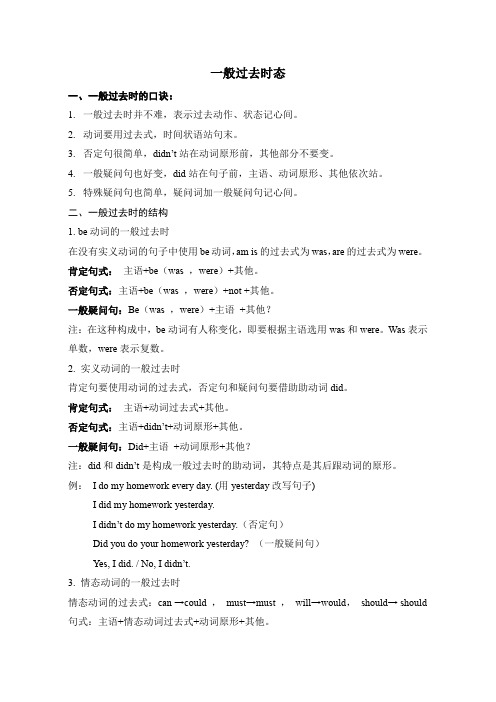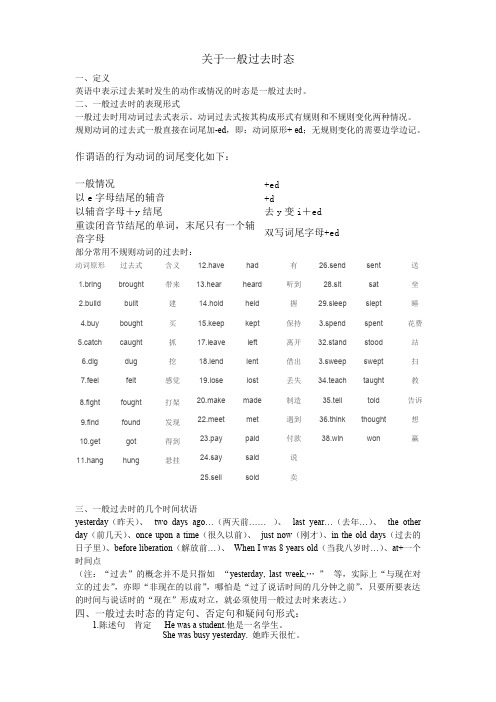一般过去时总结
一般过去时总结

一般过去时态1.定义: 1) 表示过去某个时间发生的动作或存在的状态,常和表示过去的时间状语(如yesterday, last night, in 1990, two days ago...)连用;2) 也表示过去经常或反复发生的动作, 常和表示频度的时间状语(如often, always…)连用。
例:I got up at 7:00 yesterday. My father was at work yesterday afternoon. He always went to work by bus last year. 2.时间状语:一般过去时态常用的时间状语一般来说,一般过去时都有明显的时间状语,它们可以是单词,也可以是短语或从句。
1.yesterday或以其构成的短语:yesterday morning(afternoon, evening)等;2. 由“last+一时间名词”构成的短语:last night, last year (winter, month, week)等;3. 由“时间段+ago”构成的短语:a moment ago, a short time ago, an hour ago等;4. 由“介词+一时间名词”构成的短语:on Friday, on Monday morning, on April 15, on the night of Oct. 1;5.频度副词:often, always 等;6. 其它:then, just now, once,以及由after或before构成的介词短语等7. 由某些表示过去时态的从句等。
3.用法1.表示在过去时间里发生的动作或存在的状态Liu Jie got up at 7: 10 this morning. He was a student three years ago.2.表示过去经常或反复发生的动作。
Zhang Yaru always went to school by bike last term.3.表示已故人所做的事情。
英语一般过去时语法知识归纳总结

英语一般过去时语法知识归纳总结英语的一般过去时是用来表示发生在过去的动作、事件或状态。
在使用一般过去时时,我们需要注意动词的变化规则、时间状语的使用以及动作的描述。
一、动词的变化规则一般过去时中,动词的变化分为两种情况:一是一般动词的变化,二是不规则动词的变化。
1. 一般动词的变化一般动词在一般过去时中,大部分动词都需要加上-ed结尾来表示过去时。
例如:- walk → walked- play → played- study → studied在一些情况下,一般动词的末尾只需要加上-d结尾即可,以保持读音的规则。
例如:- love → loved- live → lived此外,一些以辅音字母+y结尾的动词,在变为过去时时需要把y变为i,并加上-ed结尾。
例如:- try → tried- carry → carried2. 不规则动词的变化不规则动词在一般过去时中的变化不遵循规则,需要记忆其特定的形式。
例如:- go → went- eat → ate- see → saw二、时间状语的使用时间状语可以用来表示动作发生的具体时间,在一般过去时中,使用不同的时间状语可以帮助我们更准确地描述过去的动作或事件。
例如:- yesterday(昨天)- last week(上周)- in 2005(在2005年)- when I was a child(当我还是个孩子时)三、动作的描述在使用一般过去时时,我们需要注意动作的描述,尽量使用简洁明了的语句来表达过去发生的事情。
同时,可以使用连词和逻辑词语来连接不同的句子,使文章更加连贯。
例如:- I went to the park yesterday. It was a sunny day.- We played football last week, but we lost the game.总结:英语一般过去时是用来表示过去发生的动作、事件或状态。
动词的变化规则分为一般动词和不规则动词两种情况,需要根据动词的不同形式来变化。
一般过去时总结

一般过去时态一、一般过去时的口诀:1.一般过去时并不难,表示过去动作、状态记心间。
2.动词要用过去式,时间状语站句末。
3.否定句很简单,didn’t站在动词原形前,其他部分不要变。
4.一般疑问句也好变,did站在句子前,主语、动词原形、其他依次站。
5.特殊疑问句也简单,疑问词加一般疑问句记心间。
二、一般过去时的结构1. be动词的一般过去时在没有实义动词的句子中使用be动词,am is的过去式为was,are的过去式为were。
肯定句式:主语+be(was ,were)+其他。
否定句式:主语+be(was ,were)+not +其他。
一般疑问句:Be(was ,were)+主语+其他?注:在这种构成中,be动词有人称变化,即要根据主语选用was和were。
Was表示单数,were表示复数。
2. 实义动词的一般过去时肯定句要使用动词的过去式,否定句和疑问句要借助助动词did。
肯定句式:主语+动词过去式+其他。
否定句式:主语+didn’t+动词原形+其他。
一般疑问句:Did+主语+动词原形+其他?注:did和didn’t是构成一般过去时的助动词,其特点是其后跟动词的原形。
例:I do my homework every day. (用yesterday改写句子)I did my homework yesterday.I didn’t do my homework yesterday.(否定句)Did you do your homework yesterday? (一般疑问句)Yes, I did. / No, I didn’t.3. 情态动词的一般过去时情态动词的过去式:can →could ,must→must ,will→would,should→ should 句式:主语+情态动词过去式+动词原形+其他。
三、一般过去时的时间标志语yesterday, the day before yesterday(前天),last night, two days ago, in 2020, just now(刚才),at that time(在那时)。
初中英语一般过去时总结(28张)

第二部分 一般过去时的构成
7
Language points
二、一般过去时的构成 1.be动词在一般过去时中的变化: (1)am和is在一般过去时中变为______. 用于第________人称单数。 例如: 我九岁。 ___________________________________________. 我去年九岁。 ____________________________________________.
Homework
6. They _____ (make) a lot of toy planes last Tuesday. 7.1 _____ (fly) a kite with my brother in the park yesterday. 8. The mouse _____ (bite) the net and got out.
过去式 sat
swam drew sang could slept met read
Language points
动词原形 teach say begin give drink let spend
过去式 taught
said began gave drank
let spent
动词原形 ride run buy keep drive mean bring
一般过去时
contents
1 一般过去时的概念及用法
2 一般过去时的构成
3 动般过去时的概念及用法
3
Language points
一、一般过去时的概念及作用
1.一般过去时表示过去某个时间发生的动作或存在的状态,常和表示过 去的时间状语连用。 例如: My mother's handbag was on the sofa just now. We went to the farm last week.
一般过去时归纳与总结

一般过去时归纳与总结一般过去时是英语中常用的时态之一,用来描述过去发生的动作、状态或习惯。
在本文中,我们将对一般过去时的用法进行归纳与总结。
一、肯定句的构成一般过去时的肯定句由主语 + 动词的过去式构成。
例如:1. I studied English last night.2. She went to the park yesterday.3. They played football in the afternoon.二、否定句的构成一般过去时的否定句由主语 + did not (didn't) + 动词原形构成。
例如:1. I didn't study English last night.2. She didn't go to the park yesterday.3. They didn't play football in the afternoon.三、疑问句的构成一般过去时的疑问句由Did + 主语 + 动词原形构成。
例如:1. Did you study English last night?2. Did she go to the park yesterday?3. Did they play football in the afternoon?四、一般过去时的常用时间状语一般过去时常与以下时间状语连用,表示过去发生的动作或状态:1. yesterday:昨天2. last week/month/year:上周/上个月/去年3. in 1990:在1990年4. when I was a child:当我还是个孩子的时候5. at that time:那时候6. ago:以前例如:1. He visited his grandparents last week.2. We went to the beach yesterday.3. They lived in London in 1990.4. When I was a child, I played football every day.5. She bought a new car ten years ago.五、一般过去时的特殊用法1. 表示过去的习惯或经常性动作,常与副词often, usually, always连用。
(完整版)一般过去时态总结

关于一般过去时态一、定义英语中表示过去某时发生的动作或情况的时态是一般过去时。
二、一般过去时的表现形式一般过去时用动词过去式表示。
动词过去式按其构成形式有规则和不规则变化两种情况。
规则动词的过去式一般直接在词尾加-ed,即:动词原形+ ed;无规则变化的需要边学边记。
作谓语的行为动词的词尾变化如下:一般情况+ed以e字母结尾的辅音+d以辅音字母+y结尾去y变i+ed重读闭音节结尾的单词,末尾只有一个辅音字母双写词尾字母+ed部分常用不规则动词的过去时:动词原形过去式含义1.bring brought带来2.build built建4.buy bought买5.catch caught抓6.dig dug挖7.feel felt感觉8.fight fought打架9.find found发现10.get got得到11.hang hung悬挂12.have had有13.hear heard听到14.hold held握15.keep kept保持17.leave left离开18.lend lent借出19.lose lost丢失20.make made制造22.meet met遇到23.pay paid付款24.say said说25.sell sold卖26.send sent送28.sit sat坐29.sleep slept睡3.spend spent花费32.stand stood站3.sweep swept扫34.teach taught教35.tell told告诉36.think thought想38.win won赢三、一般过去时的几个时间状语yesterday(昨天)、two days ago…(两天前…… )、last year…(去年…)、the other day(前几天)、once upon a time(很久以前)、just now(刚才)、in the old days(过去的日子里)、before liberation(解放前…)、When I was 8 years old(当我八岁时…)、at+一个时间点(注:“过去”的概念并不是只指如“yesterday, last week,…”等,实际上“与现在对立的过去”,亦即“非现在的以前”,哪怕是“过了说话时间的几分钟之前”,只要所要表达的时间与说话时的“现在”形成对立,就必须使用一般过去时来表达。
常见一般过去时用法总结
一般过去时知识点总结用法①:含有was/were常表示过去存在的状态am/is过去时was are过去式were例句:(1)I was happy last week.,(2)There was a bottle on the desk just now.时间状语:①yesterday(昨天)/yesterday morning/evening/afternoon (昨天上午、下午、晚上)/the day before yesterday 前天②ago(……之前)/a moment ago(不久前)/two minutes ago (两分钟之前)/a year ago (一年前)/half a month ago(半个月之前)③last(上一个)/last night/Monday/week/month/spring/year(昨天晚上、上周一、上周、上个月、去年春天、去年)④just now (刚刚)⑤一个过去的时间:如in 2008 (在2008年)/on 3rd October (在10月3日)句型转换(1)I was happy last week.①②变否定:I was not (wasn’t) happy last week.方法:一找be(was/were),二在be(was/were)后加not,三若有some 变any,若有and变成or。
变一般疑问句:Were you happy last week?方法:一找be(was/were),二在把be(was/were)提前,三若有some 变any,若有and变成or,四主语第一变第二。
肯定回答:Yes, I was. 否定回答:No, I wasn’t.对划线①提问:How were you last week?对划线②提问:When were you happy?方法:一判断:判断划线部分是什么内容,二选择:选择合适的特殊疑问词替换划线部分,三特殊疑问词放句首,四后面接一般疑问句。
一般过去时语法总结
重点语法
一般过去时
1.定义:表示过去发生的事情。
2.一般过去式be动词用was,were。
3.一般过去时动词要用过去式,动词变过去式规则:
1)一般直接加ed.
2)以不发音的e结尾直接加d.
3)辅音+y结尾,把y改i+ed.
4)辅元辅,倒着数,双写最后的字母+ed.
4.一般过去时关键词:
yesterday(昨天),last year(去年),last month(上个月),last night(昨晚),last week(上周),three days ago(三天前),in+过去年份(如in 2001),this morning(今天早上)等等。
5. 不规则动词的过去式形式:
6.一般过去式一般疑问句:
be动词was,were时,把was,were放在句首。
Was there any +可数名词单数或不可数名词....?
Yes, there was./No, there wasn’t.
Were there any+可数名词复数.....?
Yes, there were./No, there weren’t.
有动词时变一般疑问句,把Did放句首,动词恢复原形。
Did+主语+动词原形....?
Yes,...did./No,...didn’t.
7.一般过去时的特殊疑问句形式:
What?did+主语+动词原形...?
回答:主语+动词过去式...。
初中英语知识点总结一般过去时
初中英语知识点总结一般过去时一、一般过去时的用法:一般过去时表示过去发生或完成的动作、存在的状态或做过的事情。
1.表示过去一些时间发生的动作或存在的状态:- I played soccer yesterday.(我昨天踢足球。
)- He lived in Beijing when he was young.(他年轻时住在北京。
)2.表示过去的习惯性动作或经常发生的动作:- When I was a child, I always went to bed early.(我小的时候总是早睡。
)3.表示过去的客观事实或真理:- The dinosaurs died out millions of years ago.(恐龙在几百万年前灭绝了。
)- She didn't know the answer to the question.(她不知道问题的答案。
)4.表示过去的心理活动、愿望或打算等:- I wanted to be a doctor when I was young.(我年轻时想做一名医生。
)- He hoped to go to the park with his friends.(他希望和朋友去公园。
)二、一般过去时的构成:1.肯定句式:主语+动词的过去式+其他成分- I played basketball last week.- She lived in London for three years.- They watched a movie at the cinema yesterday.2.否定句式:主语 + did not / didn't + 动词原形 + 其他成分- I didn't play basketball last week.- She didn't live in London for three years.- They didn't watch a movie at the cinema yesterday.3.疑问句式:Did + 主语 + 动词原形 + 其他成分?- Did you play basketball last week?- Did she live in London for three years?- Did they watch a movie at the cinema yesterday?三、一般过去时的特殊情况:1.动词过去式的构成规则:a) 一般情况下,动词的过去式在词尾加上-ed:walk - walked(走)talk - talked(说话)play - played(玩)b)以字母e结尾的动词,在词尾只加-d:dance - danced(跳舞)c) 以辅音字母+y结尾的动词,将y变为i,再加-ed:study - studied(学习)d) 以重读闭音节结尾,末尾只有一个辅音字母的动词,双写这个辅音字母,再加-ed:stop - stopped(停止)plan - planned(计划)2.部分动词的过去式不规则,需要记忆:be - was / were(是)have - had(有)go - went(去)do - did(做)write - wrote(写)see - saw(看见)eat - ate(吃)drink - drank(喝)take - took(拿)四、表示一般过去时的时间状语:1.表示过去一些时间的状语:yesterday(昨天)last week(上星期)two days ago(两天前)2.表示过去的时间段的状语:when I was young(我年轻时)in my childhood(在我童年时)in the past(在过去)3.表示过去曾经做过的动作的状语:once(一次)五、注意事项:1. 一般过去时的句子中,谓语动词要用过去式,但be动词有时会用was或were。
初中英语时态之一(一般过去时总结)
一般过去时(simple past tense)表示过去某个时间里发生的非持续性动作或存在的状态,用动词的过去式表示,常和表示过去的时间状语连用,如:yesterday,last night,in 1990,two days ago,before,the age of等。
一般过去时也表示过去经常或反复发生的动作,常和often,always等表示频率的时间状语连用。
表示过去习惯性、经常性的动作、行为;过去主语所具备的能力和性格。
一般过去时不需考虑第三人称单数(简称三单)的变化。
句法结构肯定形式主语+动词过去式+其他例句:She often came to help us in those days.否定形式一般疑问句①Did+主语+谓语动词原型+其他?②②Was\Were+主语+表语?例句:Did I do homework?需要注意Be 动词、情态动词、实意动词的变化1.Be 动词的一般过去时态.在没有实义动词的句子中使用be动词,am is 的过去式为was; are的过去式为were.构成:肯定句:主语+was (were) +表语如:I was late yesterday. (昨天我迟到了。
)否定句:主语+was (were) +not+表语如:We weren't late yesterday. (我们昨天没有迟到)【注意】:当句中含有系动词was,were时,可直接在其后加not构成否定句。
如:I was on the Interntwhen you called me.当你打电话给我时,我在上网。
→ :I was not/wasn't on the Internt when you called me .当你打电话给我时,我不在上网。
疑问句:Was (Were) +主语+表语当谓语动词提前并直接或间接表达注意时态特殊疑问句:特殊疑问词+was (were) +主语+表语2.实义动词的一般过去时态肯定句要使用动词的过去式,否定句和疑问句要使用助动词do和does 的过去式did.否定句:主语+didn't +动词原形+宾语疑问句:Did +主语+动词原形+宾语3.助动词和情态动词过去式如下:shall―should(将要)用于第一人称单数will―would(将要)用于所有人称can—could(能,会)may―might(可以)must―must (必须)have to―had to(不得不)助动词和情态动词的过去时态要使用他们的过去式,后面的动词还使用原形。
- 1、下载文档前请自行甄别文档内容的完整性,平台不提供额外的编辑、内容补充、找答案等附加服务。
- 2、"仅部分预览"的文档,不可在线预览部分如存在完整性等问题,可反馈申请退款(可完整预览的文档不适用该条件!)。
- 3、如文档侵犯您的权益,请联系客服反馈,我们会尽快为您处理(人工客服工作时间:9:00-18:30)。
一般过去时总结(Simple Past Tense)
一般过去时也译为单纯过去时。
例A:He worked very hard last year.
(去年他很用功。
)
例B:Mr. Smith bought a new car yesterday.
(史密斯先生昨天买了一辆新车。
)
例C:They were here only a few minutes ago.
(几分钟前他们还在这里。
)
一、一般过去时的用法:
解说:一般过去时最明显的现象就是常由表达过去之时间的副词或副词短语来修饰它(如各例句的斜体字部分)。
这些常用于修饰一般过去时的副词有:yesterday, yesterday morning (afternoon, evening ), just now (刚才), before (以前), then (at that time )(当时), last +时间(如last week, month, year, Monday, … January, … spring, …, etc. ), that +时间(如that day, afternoon, summer, …, etc. ), 时间+ ago(如a few minutes ago, two weeks ago , years ago, … etc.)
二、一般过去时的主要语法功能:
1. 表示过去发生的动作或情况, 过去时间可以由状语或上下文表示出来:
e.g. He returned home very late last night. 他昨晚很晚回家。
He turned off TV at midnight. 他午夜才关了电视。
他常常在午夜后才关电视。
He often turns off TV after midnight.
2. 表示过去反复发生的或习惯性的动作,常和never, often, usually等状语连用。
e.g. She often swam/ went swimming last summer. 去年夏天她经常去游泳。
In the past few years, Mary seldom called her grandfather.
过去几年中,玛丽很少给她爷爷打电话。
3. 可用在said, reported等后面的间接引语中,代替一般现在时。
e.g. She said, "I'm tired of his long speech."----She said that she was tired of his long speech. 她说她烦透了他的长篇大论。
The doctor reported, "The patient is very well."----The doctor reported that the patient was very well. 医生说患者情况良好。
4. 用在时间和条件状语从句中,代替过去将来时。
e.g. Father promised to buy me a new bike when he got/would get his pay the next day.父亲答应明天拿到工资后给我买辆新自行车。
He said she would lose her temper if she knew the truth. 他说如果她知道真相会发脾气的。
5. 用在对话中重复对方刚提到的事。
e.g.A: I'm hungry. B: What did you say? 我饿了。
你说什么?
A: Her name is Mary. B: What was her name?她名叫玛丽。
刚才你说她叫什么名字?
一般过去时专练
一、写出下列动词的过去式:
agree buy climb
can enjoy go
forget finish know
happen say hope
see invent find
二、句型转换:
1. Ann did her homework yesterday evening. (否定句)
2. Last week I read an English book. (一般疑问句)
3. I lived in Nanjing for 10 years. (对划线部分提问)
4. His father moved to America last year. (对划线部分提问)
三、用动词的正确形式填空:
1.My mother ________________ (not do) housework yesterday.
2. __________ your father __________ (go) to work every day last year?
3. A:You __________(not be) at school last Friday. Where __________(be) you?
__________ (be) you ill?
B:No, I __________(be). But my mother __________(be). I _________ (stay) at home and __________(look) after her.
A:I __________(be) sorry __________(hear) that. __________(be) she better now?
B:Yes, she __________(be). Thank you.
4.Jim with his parents ___________________ (visit) the Great Wall the day after tomorrow.
答案及解析:
agree--agreed buy--bought climb--climbed
can—could enjoy—enjoyed go -- went
forget – forgot finish—finished know--knew
happen—happened say—said hope—hoped
see—saw invent—invented find—found
解析:
这道题是考学生对于动词过去时变化的掌握情况的,其中有规则变化的也有不
规则变化的,就是看学生在底下下了多少功夫,没有什么“技术含量”。
1.Ann did her homework yesterday evening. (否定句)
Ann didn’t do her homework yesterday evening.
解析:在原句中的did是短语do one’s homework的过去时形式,改为否定句我们需要在加上一个did作为助动词,助动词后面只跟动词原型。
2. Last week I read an English book. (一般疑问句)
Did you read an English book last week?
解析:这句话是一般过去时的句子,因为时间状语是last week,read这个单词的过去式形式拼写是不变化的,所以容易让人觉得那不是过去式。
3. I lived in Nanjing for 10 years. (对划线部分提问)
How long did you live in Nanjing?
解析:一般过去时的句子特殊疑问句的问法。
Wh疑问词+ did + 主语+ 谓语的其他部分。
4. His father moved to America last year. (对划线部分提问)
Where did his father move last year?
方法同上。
三、用动词的正确形式填空:
1. My mother _didn’t do_ (not do) housework yesterday.
2. ___Did____ your father ___go__ (go) to work every day last year?
3. A::You __weren’t__(not be) at school last Friday. Where ___were___(be) you?
____Were__ (be) you ill?
B::No, I __wasn’t__(be). But my mother __was__(be). I __stayed__ (stay) at home and __looked__(look) after her.
A:I ___am___(be) sorry __to hear__(hear) that. __Is___(be) she better now?
B:Yes, she___is___(be). Thank you.
4.Jim with his parents ___will visit___ (visit) the Great Wall the day after tomorrow.
解析:这几道题主要考察我们对于一般过去时句型变化的掌握,最难的是第三题对话中后面说I am sorry to hear that. Is she better now? 这两句话是对话人当时的反应和问候,不用过去时。
当然还有最后一句,时间状语是the day after tomorrow, 所以也不用过去时,用将来时。
